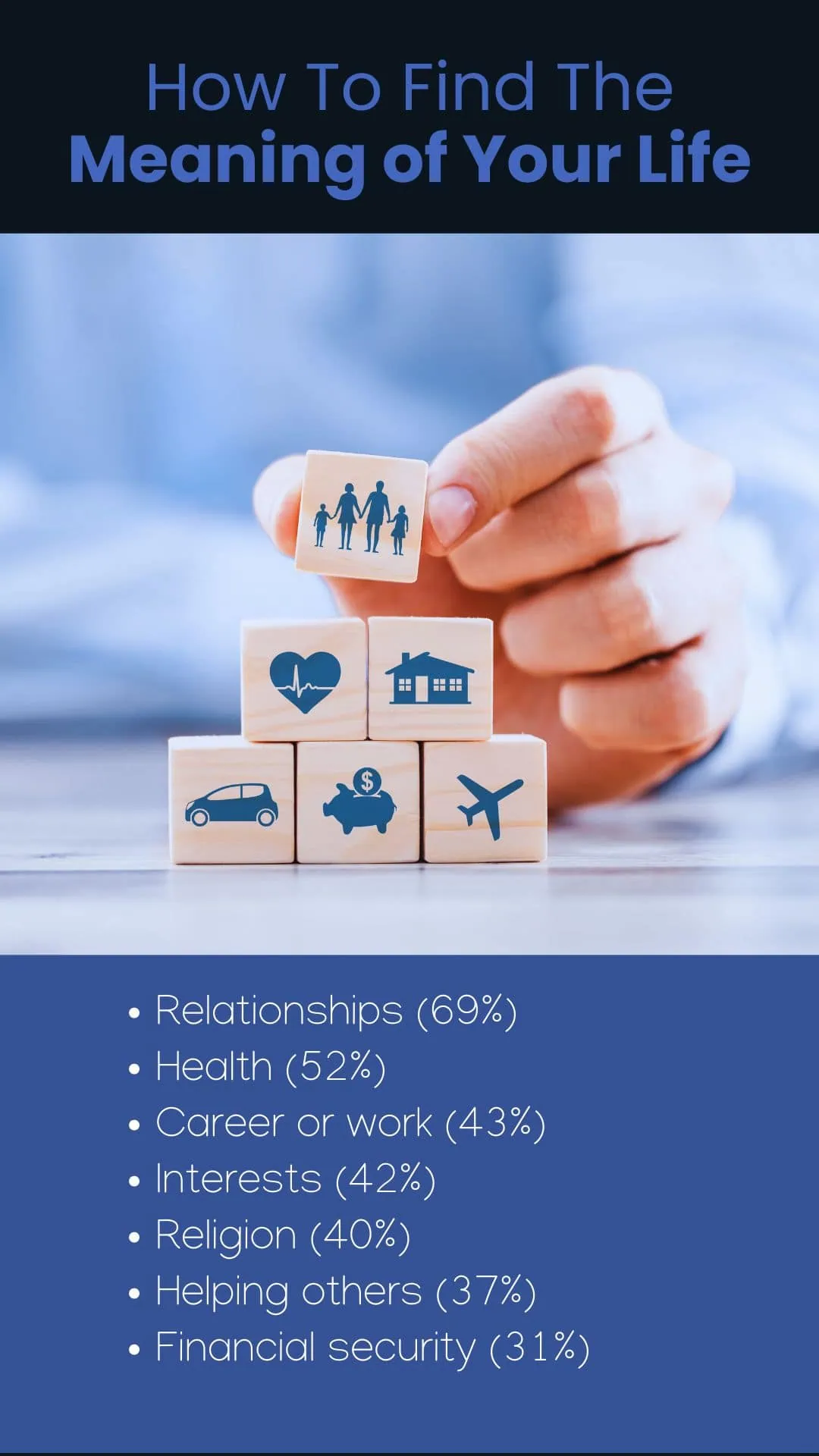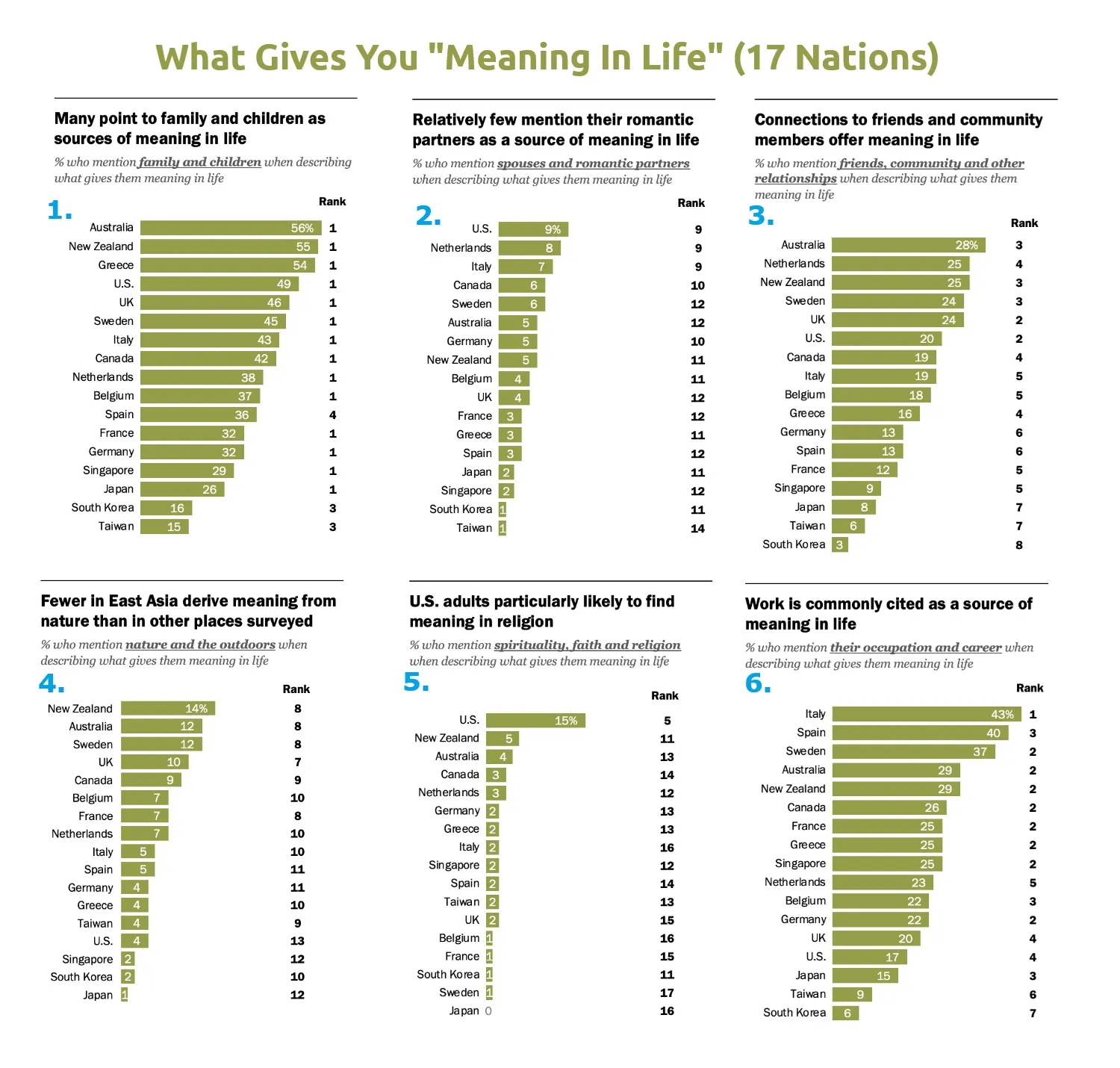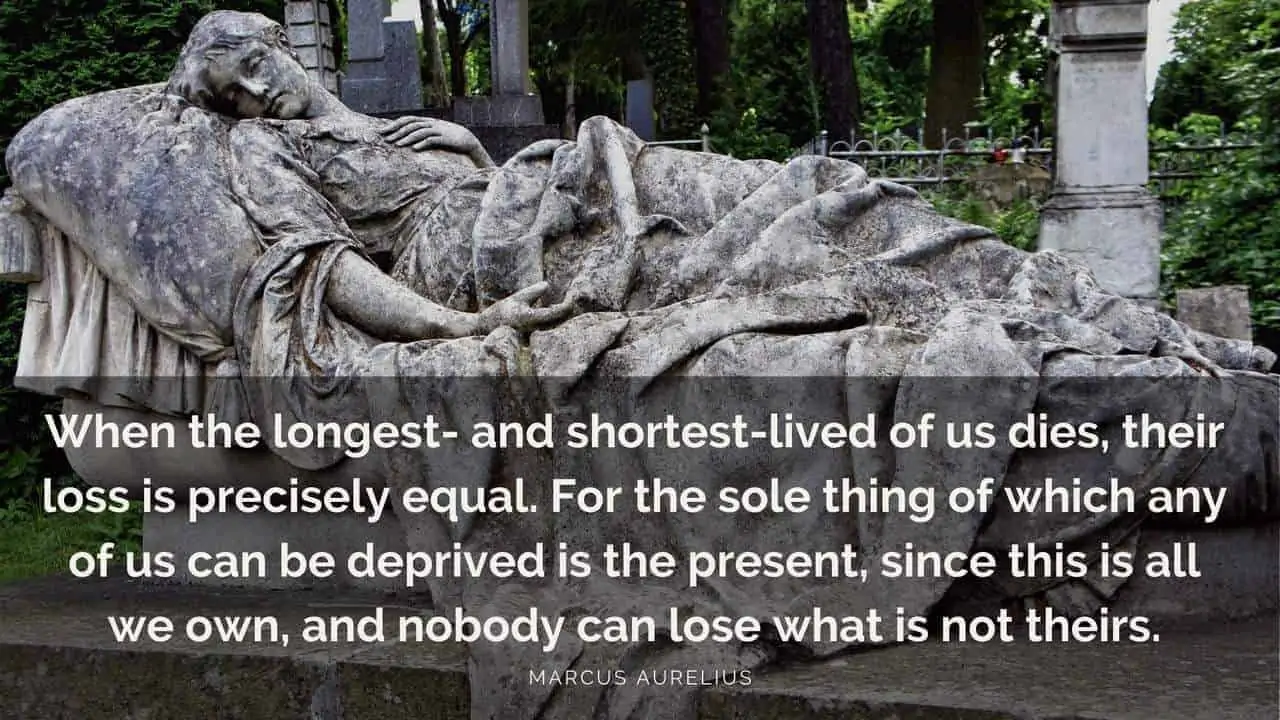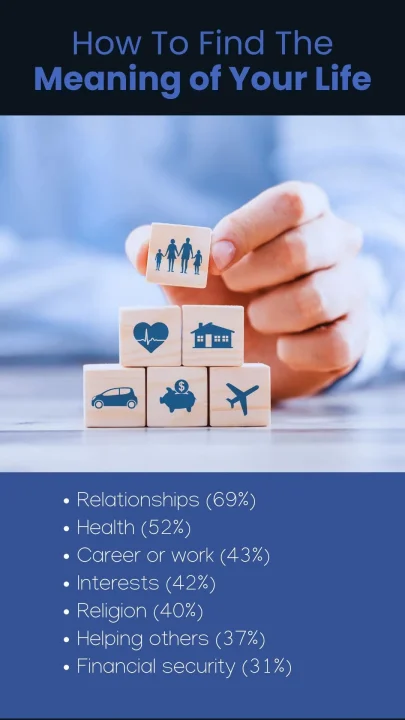— Researched and written by Dr. Sandip Roy.
“For which purpose have I come to existence? “What is my meaning in life?”
What makes our lives meaningful has been studied by philosophers, psychologists, and religious scholars for centuries.
A meaningful life makes us feel like we matter in this great sea of humanity. It is an authentic life that aligns with our values, giving us a sense of worthiness and fruitfulness.
We generally understand meaning to be a sense of purpose in our existence that, when fulfilled, gives our life a unique value. Meaning as purpose was inspired by the work of the psychiatrist Viktor Frankl (1963). He said that when people have purposes and clear aims, a state of meaning arises.
A happy life and a meaningful life are not always connected. Happiness is part of the good life, but it’s different from meaningfulness.
So, what is your meaning in life?
Finding Meaning In Life: Living For What Matters Most
Relationships, work, material well-being, personal values, goals, and aspirations, contributions to others, personal growth, and appreciation of the good things in life are some of the most important things that give our lives meaning.
These are what give us meaning in life:
1. Family And Relationships
Family and friends come first when it comes to having a meaningful life.
A 2021 Pew Research Center study on seventeen advanced economies found that:
- Family is the most important source of meaning in life for people in 14 of the 17 advanced economies surveyed.
- Occupation and material well-being were also important sources of meaning, but they were not as important as family.
- There were some age-related differences in what people found meaningful. Younger people were more likely to emphasize their friends, education, and hobbies as sources of meaning, while older people were more likely to discuss retirement and health.
Overall, the findings of this study suggest that people find meaning in life through their relationships with others, their work, and their material well-being.
So, spend more time with your family and friends but make sure they are supportive and positive.
If you end up feeling bitter and sad after each interaction with them, consider being alone until you find better friends.

2. Material Well-being
Our careers and financial success can contribute to our sense of self-worth, life-satisfaction, and meaning in life.
Having wealth that raises us out of poverty can reduce stress, improve our overall well-being, and make out more meaningful.
Once it helps us meet our basic needs, such as food, shelter, and healthcare, material well-being can give us the freedom to pursue our goals and passions.
Financial stability can also help us build meaningful social connections. For example, having the resources to travel and take part in social activities can help you connect with others.
3. Work or Profession
Our work gives our lives meaning, more than giving us financial means.
This aspect of meaning is not restricted to the idea that one’s life has value, but also encompasses the idea that what we are doing matters and has some degree of importance.
We derive a sense of purpose and meaning in life from what we do every day. A job we are proud of and that others respect can increase our sense of self-worth.
A profession that aligns with our values and passions can make us feel like we are making a difference in the world.
Accomplishing something that challenges us and allows us to develop new skills helps us feel fulfilled and engaged. Our colleagues and coworkers also provide us with a sense of community and belonging.
4. Creativity and Learning
Creating something, whether it is a work of art, a piece of music, or a new product, can give our lives meaning.
When we create something, we are leaving our mark on the world and contributing. Learning new things can also give our lives meaning.
When we learn something new, we expand our horizons and become more knowledgeable. This can make us feel more confident and capable, and it can also help us connect with others who share our interests.

5. Contribution And Charity
Contributing to the lives of others can also give our lives meaning.
Volunteering can give us a sense of community and belonging. It can reduce stress and improve mental health.
Charity (giving to those in need, often driven by compassion) can also make us happier. Studies have shown that people who give to charity are more likely to be happy and satisfied with their lives.
Studies show that altruism can help make our lives more meaningful.
Altruism is giving out of compassion, often driven by a desire to create a better world for everyone. Effective altruism is a social movement that seeks to maximize the good that one can do in the world.
When we help others, we can bask in the warm glow of making a positive impact on the world. It helps us feel we are part of something larger than ourselves, something that transcends our individual existence.
This sense of contribution and connection can bring a deep sense of fulfillment and purpose.
6. Values, Goals, and Aspirations
Personal values, goals, and aspirations can help make our lives more meaningful by providing direction and purpose in life.
They help us identify what is important to us and guide our decision-making. They help us understand what we want to achieve and why it matters.
Our goals motivate us to take steps to pursue our dreams. Our aspirations give us reasons to work hard against obstacles.
Our passions and dreams are also a vital part of our identity. They help us understand who we are and what we stand for.
When we see our efforts resulting in dreams being fulfilled, we feel a sense of satisfaction.
7. Growth and Gratitude
Personal growth and gratitude can make our lives more meaningful.
A desire for personal growth gives us a direction in life. It allows us to identify areas we wish to improve and set goals for ourselves, thereby infusing our lives with a sense of purpose.
This understanding of what we want to achieve, and why, fuels us to take action, pursue our dreams, and achieve things despite challenges.
Growing as a better version of ourselves enhances the meaning of our lives.
Gratitude is a positive emotion. It is the act of recognizing and acknowledging the good things in our lives, feeling a state of appreciation, and working to return the kindness.
Practicing gratitude has been linked to greater well-being and life satisfaction, as it allows us to focus on the positive aspects of our lives, amplifying our sense of contentment and joy.
Gratitude also enables us to live more authentically. Authentic living is living according to one’s values, beliefs, and desires, not what others expect or what others think is important.
Being authentic can help us embrace our uniqueness and vulnerability, without fearing judgment or rejection. It can motivate us to take value-based risks, even if it means facing rejection or failure.
This often leads to a life that is not only fulfilling but also deeply meaningful.
Pew Research on The Meaning of Life
Pew Research Center asked people from 17 nations, “What gives you meaning in life?”
72% believed that life has a specific meaning or purpose. And their top responses for what gives people’s lives meaning were:

- Relationships with family (69%)
- Health (52%)
- Career or work (43%)
- Hobbies or interests (42%)
- Religion or faith (40%)
- Helping others or contributing to society (37%)
- Financial security (31%)
- Personal achievements (26%)
- Living according to moral principles (25%)
Some more surprising findings were the differences in East Asian nations:
- East Asians (Taiwan, South Korea, Japan, Singapore) get less meaning from family and children.
- Nobody gets much meaning from having romantic partners; almost zero East Asians do.
- Few East Asians get meaning from friends and community.
- Nature and the outdoors do not give East Asians much meaning.
- Almost none (except US people) get meaning from spirituality, faith, and religion.
- Work: Surprisingly, East Asians find occupation and career give them less meaning in life than Westerners do.

The Deathbed Test
How to quickly find the meaning of your life? Take the deathbed test—a strange but effective thought experiment.
Imagine yourself in your final moments, reflecting back on your life. Think of the things that were most important in your life, the things you were proudest of, what made your life meaningful, and the things you wouldn’t regret doing all over again.
People close to death usually have a deeper understanding of their lives. This lets them think about things they would have done differently.
“You won’t necessarily regret not being happy, but you’ll regret if you did not lead a meaningful life.”
— Emily Esfahani Smith

The Meaningless Pursuit of Happiness
A perfectly happy life does not make our lives meaningful.
“Did you know that the first Matrix was designed to be a perfect human world. Where none suffered. Where everyone would be happy. It was a disaster. No one would accept the program…The perfect world was a dream that your primitive cerebrum kept trying to wake up from.”
— Agent Smith, The Matrix, 1999
Endless happiness should have been a successful idea, but it wasn’t. None of us wants to be permanently happy, especially when all that happiness is unearned and undeserved.
We, of the present generation, are the wealthiest and the healthiest of all humans that have ever existed on this earth. But we are more unhappy than ever before, more miserable than anytime ever before.
The problem is with the pursuit of happiness. Our chasing of happiness has gone in vain. Research has shown that being fixated on happiness can make people feel lonely and unhappy.
John Stuart Mill, the British philosopher, doubted whether the quest for happiness was something to be desired at all. He said, “It’s better to be Socrates dissatisfied than a fool satisfied.” Robert Nozick, the American philosopher, wrote, “There is more to life than feeling happy.”
Suicide And The Loss of Meaning In Life
Nearly 40,000 Americans and 1 million people worldwide end their own lives each year. As per the CDC, 75% of these cases involve men.
The aftermath of suicide often leaves loved ones in shock. They wonder why someone who seemed content would choose to end their life.
Research explains: Many of them had lost their sense of meaning in life.
This study found that about 13% of suicide note authors expressed that their lives weren’t worth living. They felt their life had no purpose, and chose to escape it permanently.
Oishi and Diener (2014) asked 142,000 people from 132 countries:
- How satisfied are you with your life?
- Do you feel your life has an important purpose or meaning?
They found that people in wealthier nations reported higher happiness levels but lower levels of meaning in their lives. They were more individualistic and less religious.
Conversely, people in poorer countries, such as Niger, Togo, and Ethiopia, reported less happiness but more meaningful lives. They were less individualistic but more religious.
Surprisingly, wealthier nations had higher suicide rates.
Oishi and Diener concluded that the absence of meaning in life, not happiness or unhappiness, led to higher suicide rates. They suggested religion could be why the poorer people felt more meaning in their lives.
Author’s request to you: Please stop saying, “… committed suicide.” The word “committed” wrongfully blames the person who was a victim in the suicide. I suggest you use, “… died by suicide.”
Final Words
- People with more meaningful lives tend to be happier and healthier.
- But meaning in life is not given to us; it is something that we create.
- And finding meaning in life is something we must work at throughout our lives.
Find out what makes your life worth living.
And live your one life well!
√ Please share it with someone if you found this helpful.
√ Also Read: 10 Ways To Be Happy In Daily Life: What Do The Experts Say?
• Our Story!
